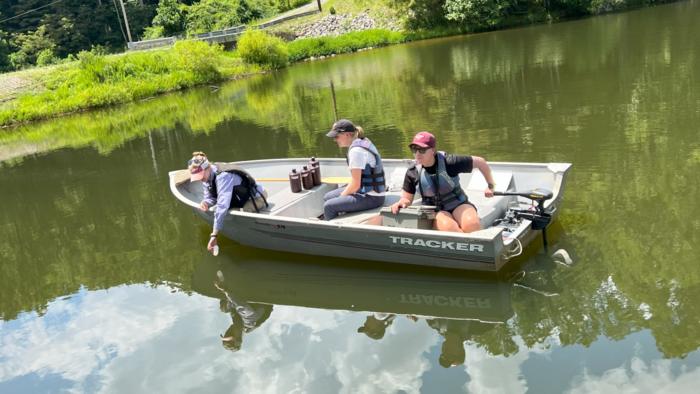Safe drinking water is threatened globally by the increased toxicity of phytoplankton — or microscopic algae — blooms.

Credit: Photo courtesy of Ryan Keverline.
Safe drinking water is threatened globally by the increased toxicity of phytoplankton — or microscopic algae — blooms.
The need for a better understanding of when and where the blooms will emerge spurred Virginia Tech researchers to start developing the first automated, real-time lake phytoplankton forecasting system. Working with the University of Florida, Virginia Tech faculty have been awarded a $2.2 million National Science Foundation grant as one of 12 projects funded by the foundation’s new Using the Rules of Life to Address Societal Challenges program.
“The enormous opportunity to apply biological principles to solving the biggest problems of today is one we cannot take lightly,” said Susan Marqusee, the foundation’s assistant director for biological sciences. “These projects will use life to improve life, including for many underprivileged communities and groups.”
Phytoplankton play a key role in sustaining life on Earth as the base of aquatic food webs and in producing oxygen. But increasing water temperatures and nutrient pollution are transforming the freshwater environments where phytoplankton live, causing large proliferations of phytoplankton, or blooms, in many lakes and reservoirs.
“Phytoplankton blooms are one example of an emergent behavior many species exhibit that can have ecosystem-scale, societally important consequences, yet are challenging to predict,” said Cayelan Carey, professor of biological sciences, who will serve as the lead principal investigator.
An affiliated faculty of Fralin Life Sciences Institute, Carey will lead four Virginia Tech researchers spanning three colleges and five departments and one researcher at the University of Florida in integrating cutting-edge lake ecosystem models and statistical software with cloud and edge computing — processing data closer to where it’s being generated — to create daily forecasts for the next 35 days. The forecasts will be provided to local water managers, who researchers will be working with in tandem.
“If managers had forecasts of phytoplankton blooms, they could preemptively act to mitigate water quality impairment (e.g., apply algaecides, adjust water treatment), thereby decreasing costs and improving drinking water safety,” said Carey, who also serves as the Roger Moore and Mojdeh Khatam-Moore Faculty Fellow in the College of Science.
The ripple effect
The project will first establish workshops with local water managers to evaluate drinking water risks with the broader impact coming through the deployment of the automated phytoplankton forecasting system at lakes across the country. This system will be developed at drinking water reservoirs in Roanoke in partnership with the Western Virginia Water Authority and will build on the partnership between Carey and the water authority, who have worked together since 2013.
“Our customers directly benefit from our partnership with Virginia Tech,” said Sarah Baumgardner, director of public relations at the Western Virginia Water Authority. “This research currently informs the reservoir management and treatment decisions our operators make. Now we’re excited to take this research one step further to educate even more members of our community.”
In addition to building the forecasting system, a major goal of the project will expand established educational outreach programs, including
- Water science lessons for K-12 students at drinking water reservoirs.
- Teaching modules on forecasting and freshwater ecosystems for high school students and community college students in water/wastewater certificate programs.
- Expanded versions of modules for four-year undergraduate STEM programs, which will be piloted and tested in Virginia Tech’s Computational Modeling and Data Analytics classes.
The grant also will support the development of workshops aimed at state and federal agency managers, as well as international lake scientists to ensure broad adoption.
The team making waves
Each faculty member brings a unique perspective and approach to addressing the overarching goal of improving drinking water management in the face of global change.
- Quinn Thomas, associate professor and Data Science Faculty Fellow, Department of Biology in the College of Science and Department of Forest Resource and Environmental Conservation in the College of Natural Resources and Environment, Global Change Center affiliated faculty
- Madeline Schreiber, professor of hydrogeosciences and associate department head, Department of Geosciences, College of Science
- Ryan Calder, assistant professor of environmental health and policy, Virginia-Maryland College of Veterinary Medicine, Global Change Center affiliated faculty
- Robert Gramacy, professor of statistic, College of Science
- Mary Lofton, postdoctoral researcher; Department of Biological Sciences
- Renato Figueiredo, professor of electrical and computer engineering, University of Florida




